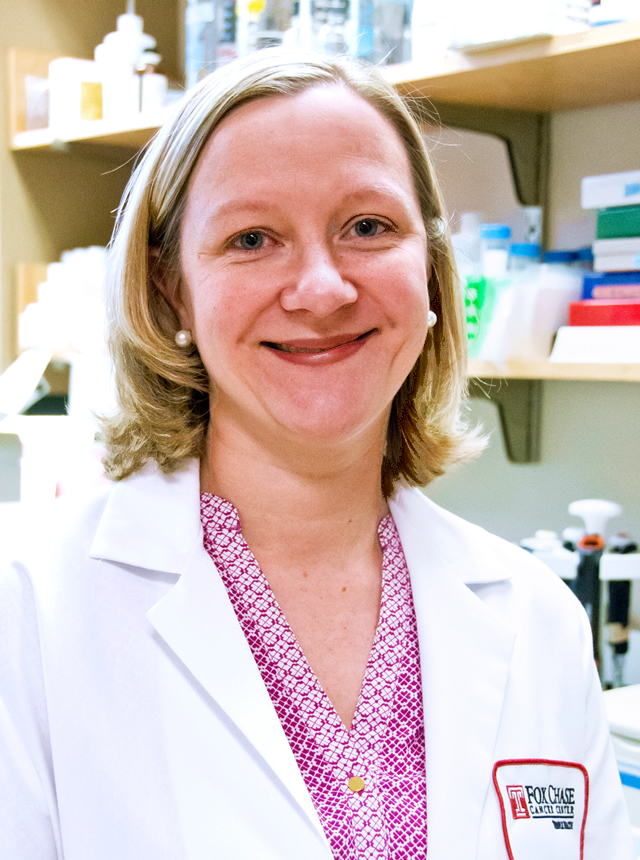Successful Scientists in Her Corner

Growing up in Scranton, Pennsylvania, as the daughter of a nurse, science and health care were topics of interest for Lori Rink, PhD. Her grandmother’s role as a librarian also had an influence on her. “It was reading and education, the stress on education. That was really instilled in us,” said Rink.
That emphasis on education is what launched Rink, an assistant professor in the Molecular Therapeutics program at Fox Chase Cancer Center, into her role as a scientist. Rink studies a rare cancer called gastrointestinal stromal tumor (GIST) and Gleevec, the one drug that seems to work for patients with GIST.
Rink’s scientific journey began in her birthplace, when she attended the University of Scranton and majored in biology and began her first forays into research. “We weren’t doing anything cancer-related. It was more physiological, studying the cardiac cycle and hearts,” she said. “I think asking those research questions is what got me excited about science.”
She had been considering going to medical school, but her experiences in the lab changed that. “Once I got the research experience, that shifted completely.”
Rink went on to Temple University in Philadelphia, where she earned a doctorate in molecular biology with Tomasz Skorski, MD, PhD. The years that Rink spent at Temple coincided with the emergence of personalized medicine, which uses information about a patient’s genes or proteins to identify or treat disease.
For example, about 85 percent of GIST harbors a mutation in a gene called KIT, which drives the tumors. Gleevec, which was approved by the Food and Drug Administration in 2001, works by targeting this gene. “All of a sudden I felt like you could see in science how basic research was impacting clinical treatment,” Rink said of that time. “That fascinated me.”
After Temple, Rink came to Fox Chase for a postdoctoral fellowship with Andrew Godwin, PhD, who is now at the University of Kansas Medical Center. Godwin encouraged her to apply for a K99 Pathway to Independence Award from the National Cancer Institute.
But just as Rink found that she had been awarded the prestigious five-year grant, Godwin announced he was leaving Fox Chase. The first two years of the grant required a mentor for training, so Rink turned to Margaret von Mehren, MD, associate director for clinical research, and Erica Golemis, PhD, chair of the Molecular Therapeutics program.
Prior to Gleevec, the only option for patients with GIST was surgery, so the drug has changed the lives of many patients. But for most, it eventually stops working, and Rink and von Mehren wanted to understand why. They have received large grants to investigate the problem and have also identified genetic markers that could predict how patients will respond to Gleevec. They are also investigating using a combination of drugs to attack GIST.
Rink said she feels very lucky having successful scientists such as von Mehren and Golemis in her corner. “I get two different perspectives, that clinical perspective from Meg, which is really, really important for a translational scientist, but also, some of the nitty gritty in terms of what methods or analyses to use from Erica,” she said.
“I’m very grateful for both of them because you wonder what you’re going to do next once the person you’ve trained under has left,” Rink added. “Meg was very supportive and said, ‘I’m happy to stand in there as your mentor. I know you can do this.’ She had a strong belief that I could eventually run the lab.” Rink now has two graduate students and a postdoctoral fellow in her lab.
Grateful for such impressive mentors throughout her training and still today, Rink is motivated to give back to the younger generation of scientists currently training at Fox Chase. “Not only do I want to teach these trainees how to perform rigorous and impactful scientific research, but I also hope to teach them that this can be done while maintaining a fulfilling work-life balance,” Rink said.
These are lessons she learned from both Golemis and von Mehren, she said. As the mother of three children under 12, Rink said she’s lucky to have a wonderful husband that she can manage the parenting load with, but of course there are still challenges. She said the passion she has for her research motivates her to overcome these challenges. Ultimately, this passion will help her turn into a senior mentor who motivates the next generation of scientists, marking another generation of her family with the drive for education and discovery.